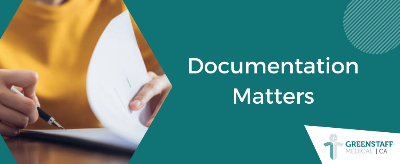
Making sure all documentation is complete, correct, and timely is one of the most important aspects of your nursing profession. “If it’s not documented, it’s not done” is an expression in the medical world that creates more anxiety in nurses than almost any other phrase.
Sloppy documentation practices can be used against a nurse in a malpractice lawsuit. Having good documentation can help nurses defend themselves and keep them out of court in the first place.
Jackie Russell RN, JD from MNA Nursing Practice and Regulatory Affairs Specialist says, “The documentation is not contemporaneous with your nursing assessment, patient care, and patient outcomes. In other words, if it’s not documented when it happened, maybe it didn’t happen that way”. When you need to go back and try and fill in the gaps, your documentation can be considered untrue, misleading, deceitful and ultimately fraud. Although your intent was not to falsify, deceive, or mislead, the more time that passes between the assessment or procedure, the more suspicious it seems - especially if a patient suffers an injury. If a medication, assessment or procedure is not recorded timely, then other care providers do not have an accurate account of a patient’s condition which may lead to poor outcomes, as well as death.
The phrase “If it wasn’t documented, it wasn’t done” will be used to convince the jury that essential care was not given and question the nurse’s credibility or documentation. Missing documentation combined with a poor outcome complicates the defense of cases no matter what strategy is used.
Kati Kleber MSN RN CCRN-K, founder and nurse educator of FreshRN suggests documenting with the outlook that someone will read it in testimony in 5 years. “Paint a clinical picture – why did you give that PRN med? What was their response? Even if you did nothing wrong, maybe the next day something happens, and they are looking closely at your documentation, and you need to be able to speak to it” Kati adds.
Pay attention to shortcuts - efficiency is key! The faster you document, the less time you spend doing it. Although that doesn’t mean that you will document less, you’ll just know how to navigate quickly.
Create a system that works, and helps you point out when you’ve missed something. It’s important to chart in real-time and use full descriptions. Chart any medication that was administered, the administration route, and the patient response. Record any phone calls that were made to physicians, the exact time, message and response. Be sure to include anything extra that needs to be documented with enough detail to tell the full story.
Your nursing license is a privilege - given to you with the purpose of providing safe patient care. It is important that as a nurse, you never falsify documentation, or any document, in relation to your nursing practice.
The importance of up-to-date record keeping is imperative, not only for the delivery of quality care but to also avoid any legal implications. As put by ACSA, “When something goes wrong or when a case conference is scheduled with the client and their loved ones, ensuring you have well-written evidence to back up any claims, actions or outcomes is essential”.
While charting may seem like a tedious and repetitive task, requiring high-quality documentation for every patient protects nurses from accusations of malpractice, improves communication across multi-disciplinary teams, reduces risk, and ensures the best care for all patients.
Sources:
https://www.nso.com/Learning/Artifacts/Articles/Do-s-and-Don-ts-of-Documentation
https://acsa.asn.au/News/If-its-not-documented-it-didnt-happen
https://www.freshrn.com/freshrn-podcasts-episode-007-documentation-for-nurses-show-notes/
https://www.medleague.com/nursing-documentation-if-you-didnt-chart-it-you-didnt-do-it/